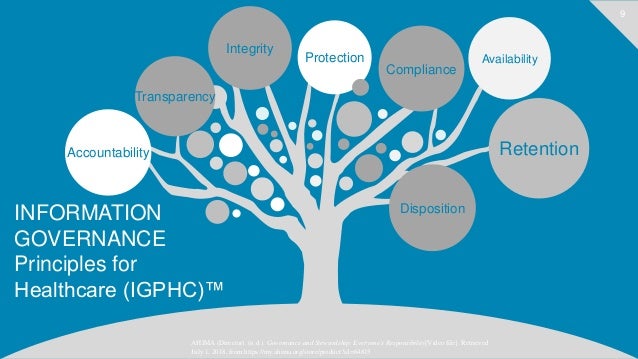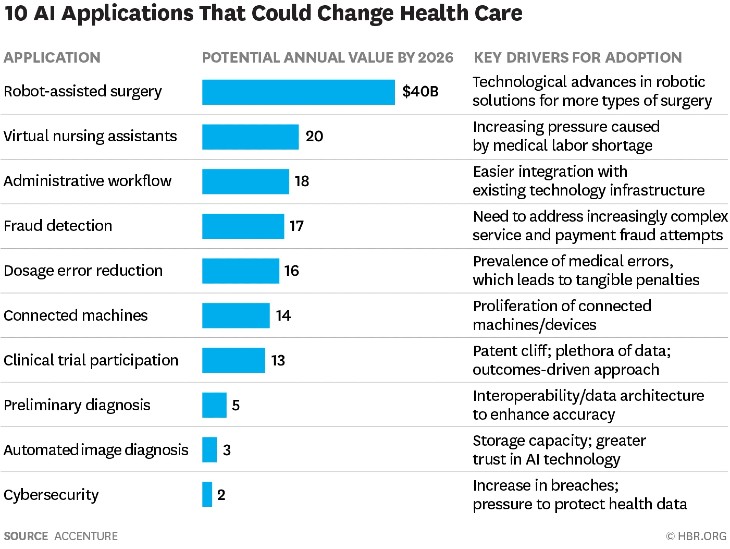October 06 2014 - The American Health Information Management Association AHIMA recently published its Information Governance Principles for Healthcare IGPHC. One member of the organizations leadership will be responsible for information governance.
 Health Information Governance Presentation
Health Information Governance Presentation
AHIMAs newly introduced Information Governance Principles for Healthcare IGPHC provides a framework for healthcare organizations to conduct their operations effectively while ensuring compliance with legal requirements and other duties and responsibilities.

Information governance principles for healthcare. It promotes the use of trusted information that is essential for patient engagement and treatment. Information governance IG in health care is defined as the structures policies and relevant procedures initiated and adhered to by hospitals health care providers and medical insurance companies to collect organize utilize and secure data. This program is important as a strategy for the.
The health information governance HIG program is an extensive organizational framework for information management across its lifecycle. Information governance establishes policy prioritizes investments values and protects information assets and determines accountabilities for managing information making it. Information governance IG is the way in which health and health care information in particular the personal particularly which allows identification and sensitive information relating to people such as patients and employees is handled.
AHIMAs new Information Governance Principles for Healthcare IGPHC provides a framework for healthcare organizations to enhance their ability to leverage information in order to achieve the organizations goals and conduct their operations effectively while ensuring compliance with legal requirements and other duties and responsibilities. Adoption of an information governance program underscores the organizations commitment to managing its information as a valued strategic asset. Every Healthcare organisation recognises that Information Governance is a business imperative.
IGPHC is an information governance framework specific to the healthcare industry which establishes a foundation of best practices for IG programs in the form of eight principles. AHIMA determined that there are. Information Governance Principles for Healthcare IGPHC 2 AHIMA.
Reliable information is essential to reducing healthcare delivery costs and. Information Governance Principles for Healthcare IGPHC AHIMA 3 Healthcare organizations must value and govern not only their clinical but their nonclinical information such as human resources operational financial legal and marketing information. Information Governance in Healthcare establishes the centralised policies procedures and accountabilities for managing the lifecycle of patient information.
Information governance will be conducted in. What are the different principles involved with respect to health information exchange. PHISC HEALTHCARE INFORMATION GOVERNANCE GUIDING PRINCIPLES FOR PRIVACY CONFIDENTIALITY INFORMED CONSENT FOR HEALTHCARE INFORMATION PHISC DISCLAIMER The information contained in this document has been developed and compiled by PHISC participants and is accordingly copyrighted to PHISC.
PREAMBLE Complete current and accurate information is essential for any organization in the healthcare industry to achieve its goals. IGPHC is a set of eight principles that when considered in whole or in part are intended to. Using the Canadian healthcare system as the backdrop the study drawing on the eight principles of information governance outlined by the Association of.
It aims to balance facility of use with security of health information. Any unauthorised dissemination of the information is strictly prohibited. The guidelines outline eight principles by which a healthcare organizations information should be managed.
Governance of clinical and operational information. Data governance in healthcare also called information governance is defined by AHIMA as an organization-wide framework for managing health information throughout its lifecyclefrom the moment a patients information is first entered in the system until well after they are discharged.










